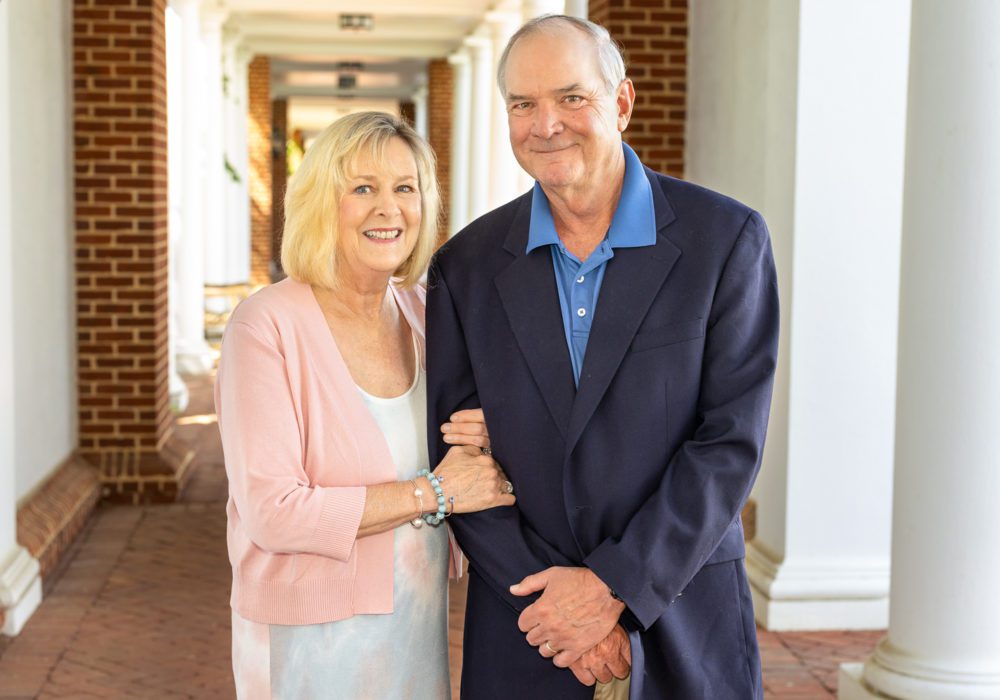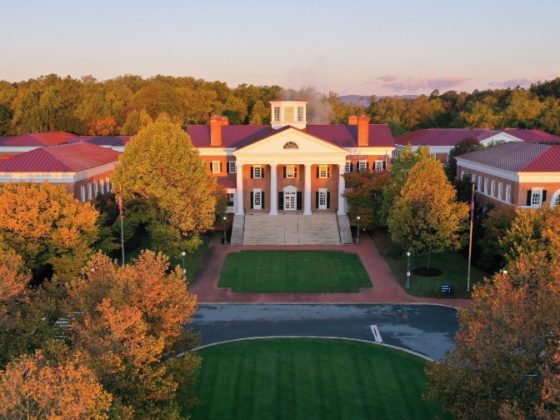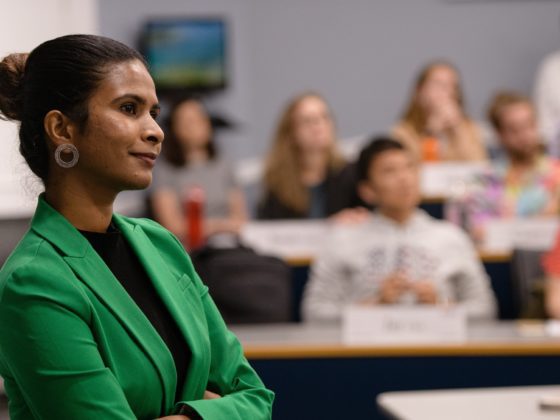Darden School alumnus David LaCross (MBA ’78) is one of the School’s most generous supporters, and his desire to give back to Darden starts with his belief in the power of the case method to develop and inspire responsible leaders who will improve the world. LaCross became one such leader throughout a successful post-Darden career that led him to Bank of America for 10 years before founding his own company, Risk Management Technologies, which was acquired in 1997.
LaCross, who with his wife, Kathleen, has established the David M. LaCross Professorship at Darden, recently answered questions about what makes Darden’s top-ranked education experience so special.
Q: What initially drew you to Darden when you were planning to go to business school?
LaCross: I thought I wanted a school that emphasized the case method and learned that Darden and Harvard really stuck out on that dimension, each approaching 80 percent of class time spent on the evaluation of business cases. I did some research at the time on the relative merits of case method versus instructional lecturing and felt that case method had some compelling advantages. Furthermore, I’m a far more efficient learner reading texts than listening to lectures. I hesitate to mention the number of lecture courses I took as an undergraduate in which I never attended a single class. So, I was convinced that I wanted to avoid a lecture-based program and that I preferred a case method MBA program. But I must admit that I did not appreciate how distinctively valuable it was until I experienced it firsthand, and even more as I looked at it in retrospect.
Q: What do you perceive to be the advantages of the case method?
LaCross: I believe that the Darden experience rests on a three-legged stool. First is the case method itself; second, the skill of the faculty in delivering the case method; and finally, the quality and makeup of every class.
Given my less than satisfactory experience with pure lecture classes, I felt that for me, learning should not be a passive undertaking. The case method of instruction requires active learning, where the primary responsibility for learning rests with the student who must study the cases, work in collaboration with a study group, and then offer solutions and/or insights to the overall class. In that process, the student receives pushback, alternative solutions or different perspectives and a civil discussion or debate ensues. And, completely foreign to pure lecture classes, the role of the professor is to facilitate and subtly guide the class discussion rather than being perpetually on “transmit.” The result, and what I believe is a major distinction of the case method, is that you are trying to apply knowledge rather than be drip-fed knowledge in a series of lectures.
Cases are typically based on actual problems that have been faced in the real world. The situations presented are complicated, often ambiguous, and just plain messy. In virtually every case, students are totally immersed and face issues that are urgent and must be addressed.
Darden’s emphasis on this mode of instruction means a hugely diverse set of cases where, in addition to specific issues, the settings will involve a variety of industries, organizations, and business functions. With that level of case study, new exposures and associated learning stretch far beyond a student’s historical experience base. As a result, you become naturally better able to address and effectively handle new and unique circumstances as your career evolves.
Employers who hire MBAs must recognize that when choosing between graduates from a case method school and a lecture school, they are looking at two quite different products. As an employer who would you prefer? An individual with hundreds if not thousands of hours exposed to, and working through, very diverse business situations, or one that had simply read, or even memorized, the manual.
Q: You mentioned faculty as the second leg of the Darden experience?
LaCross: Many have stated that the role of the professor during class discussion of a case is analogous to a symphony conductor. I think that is an astute observation, but there’s one major difference. Conductors must motivate, instill a work ethic, set expectations, demand performance and get the most out of every musician in every performance. The case instructor must accomplish that as well. But here’s where the analogy breaks down. A conductor is working from a written piece of music. It’s a script. The conductor can extract a different interpretation of the music from the musicians, but it’s still a script.
The role of a case instructor goes far beyond that. While the professor will guide the class in examining and resolving case situations, they will not provide any answers. Rather, their primary responsibility is to extract issues, analysis and solutions from the class. The challenge is that the path that the class takes cannot be known with certainty in advance. It’s certainly not a static script and that puts it in sharp contrast to a conductor’s or a lecturer’s role. With cases, the instructor will have a quite elaborate game plan, but must be very flexible as the discussion unfolds. It’s like a quarterback reading a defense and calling an audible. The audible is not random. It’s a learned reaction to specific circumstances.
The quality of Darden faculty and the work they put in to make themselves and their colleagues more effective teachers is what really leverages the skills and perspectives of individuals in the class and is a key ingredient in the secret sauce that makes the Darden experience what it is.
Q: And how do classmates figure into the Darden experience?
LaCross: In Darden classrooms, learning happens mostly in discussion. The amount of learning will depend on the quality of the students. There are, I believe, two primary components to class quality.
The first and obvious one is the raw talent of individuals who make up the class. That is certainly manifested by undergraduate transcripts. GMAT scores and work experience, all of which are important considerations in admission decisions. But in addition to these individual attributes, the diversity of a class contributes every bit as much to the Darden experience.
Diversity can be measured along many different dimensions, and all are important in varying degrees. I did not fully anticipate but recognized very quickly how valuable diversity was to my learning experience. My classmates’ different backgrounds and work experiences were made evident in every class discussion, revealing an eclectic range of different attitudes, beliefs, values, biases and ideas. The point is that these differences often produced divergent views as to what issues were important, how they should be prioritized, how they react to interdependencies and how to deal with any ethical ambiguities. It truly enriched the class discussions, offering so many new and valuable perspectives that would never surface if the class were less diverse.

Q: What were some of the most memorable moments from your time at Darden?
I’d start with my very first day: A fake fashion show involving student spouses, being assigned to my initial, randomly assigned study group, and then competing with other study groups in building a brand via a turn-based business simulation game. We did not win the game, but we certainly tried to compete as a team. I remember wracking my brain, speculating on how the simulation would evaluate input parameters such as marketing and advertising expenditures, along with pricing, and how it would affect our income statement relative to other groups. It was an ideal way to start the Darden experience.
Another memorable moment was the first time I was randomly called upon to present a case. It was in Finance relatively early in my First Year. I was well prepared, but I’ll never forget the adrenaline rush. I have no recollection of laying out the relevant case facts, issues, analysis or solution. All I can recall was the initial feeling, and a very deep breath before I started.
An important period was in between academic years, when I was hired for the summer to do some case writing for the Center for International Banking Studies, established at Darden and run by Professor Bill Sihler. The work was interesting in itself, but what I really got out of the experience was an appreciation of the skills necessary to craft a good case.
I also remember how much effort I put into the program, especially in the First Year. I arrived on a mission. We had no financial assistance from any source, so I was absolutely determined to make the most of it and to leave nothing on the table in terms of effort. Being named a Shermet award winner at the beginning of my Second Year certainly validated the effort I put into the First Year.
Q: What inspired you to reconnect with Darden after more than 40 years and give to the school so generously?
LaCross: It may seem like it came out of the blue, but not really. I recognized well before graduation that I owed a tremendous debt to Darden for its effective use of the case method, an incredibly special faculty that really knew how to get the most out of a class and my classmates. I hoped from the outset that I would be in a position to give something back some day.
My wife, Kathy, was supportive of this from the outset. She and our kids are acutely aware that they have benefited significantly, albeit indirectly, from my Darden experience. My entire family is fully behind the support we have provided to-date and what we intend to provide in the future.
Our fortunes improved significantly when I sold the company I founded, Risk Management Technologies, to Fair Isaac in 1997. We then got serious about estate planning and Darden became a significant part of our plan. It remains that way today.




